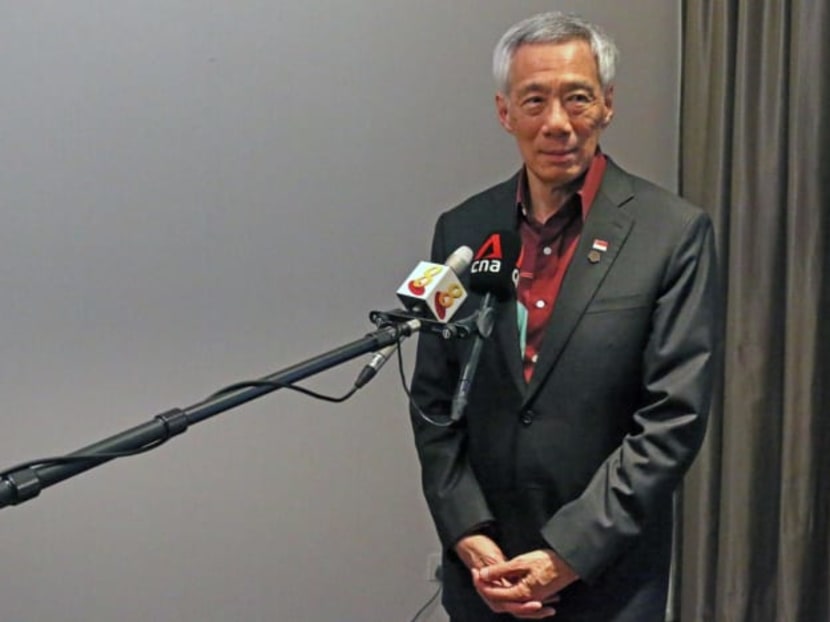Singapore must do more to diversify food sources as supply disruptions will continue: PM Lee

Prime Minister Lee Hsien Loong speaking to Singapore media at the end of the Commonwealth Heads of Government Meeting in Kigali on June 25, 2022.
KIGALI, Rwanda — Singapore must do more to diversify its food sources as countries around the world are likely to continue prioritising local supply amid soaring prices, Prime Minister Lee Hsien Loong said on Saturday (June 25).
Mr Lee was speaking to Singapore media to wrap up his attendance at the Commonwealth Heads of Government Meeting in Kigali, where he has also urged countries not to become protectionist against a backdrop of pandemic-induced supply chain shocks.
The Prime Minister on Saturday called the situation “worrying”, but added that it is also “not so surprising” that countries are closing their export markets as supplies dwindle and prices rise.
For instance, he pointed to how the war in Ukraine has disrupted the export of millions of tonnes of grain, causing a shortage in feedstock and thus an increase in poultry prices.
“Countries are under pressure and they will do things. It's not according to the rules of the WTO (World Trade Organization). You're not supposed to close your markets when supplies get short. But under pressure, this is what governments do,” he said.
“We are a food importer, so it is a problem for us. It's a problem which we anticipated already when Covid started.”
At that point, Singapore worried about its supply of poultry, vegetables and carbohydrates, Mr Lee said, adding that authorities had started expanding food stockpiles and diversifying imports from more places.
“These are things which we have to do, and which we have been doing for some time. Which is the reason why, when the supplies of chicken from Malaysia got cut off a few weeks ago, we were able to cope,” he said.
“But I think the problem will continue. And we have to do somewhat more, and MTI (Ministry of Trade and Industry) is actively working on this right now.”
After Malaysia stopped exporting chicken from June 1 to prioritise local supply, Singapore moved to import more chilled and frozen chicken products from other countries like Australia and Thailand.
In 2021, about one-third of Singapore's chicken imports came from Malaysia, with almost all of them live chickens that were slaughtered and chilled in Singapore.
Malaysia has since partially lifted its ban, allowing Singapore to resume importing live kampung and black chickens from June 14.
Mr Lee on Saturday encouraged people in Singapore to be more understanding of the situation and flexible with their food preferences, saying that this would be “helpful”.
“If you can’t get kampung chicken, you can get some other chicken. It’s not chilled, it’s frozen, well that’s not bad too. And if you can’t get one variety of rice, if there is a problem, other varieties will be available, or something else will be available,” he said.
“If we can be a little bit more flexible in our habits, it will be much easier to go through these difficult times.”
UKRAINE WAR WILL 'CARRY ON'
Beyond food supply disruptions, Mr Lee said he also discussed with other Commonwealth leaders the war in Ukraine, which he expects will “carry on for some time”.
Russian forces seized full control of the eastern Ukrainian city of Sievierodonetsk on Saturday, confirming Kyiv's biggest battlefield setback for more than a month following weeks of some of the war's bloodiest fighting.
“I think if you asked me about the state of the war in Ukraine, it's going to carry on for some time, regardless whether or not Ukraine applies for membership in the European Union,” Mr Lee said.
“It does not look like either side is ready to settle. It's a human tragedy, but they are in a situation where neither side is ready to make serious concessions.”
Mr Lee said this spells bad news for the two countries and the rest of the world, as the war will bring “uncertainty, instability, tensions, the possibility of miscalculation and escalation, wider extension of the conflict”.
The war’s “side effects”, including inflation and food supply disruptions, also come as the pandemic is not over yet, Mr Lee said, pointing to how Singapore is experiencing a growing wave of Covid-19 cases due to the BA.4 and BA.5 subvariants.
“So, we just have to be prepared for that. To be united, to be upgrading ourselves, to be transforming our economy and girding ourselves to come out from this,” he added.
“And to continue to come out from this present situation ahead of the other countries, whatever the difficulties, I think that's well within our capabilities.”
WORLD IN 'NEW POSITION'
Adding to the challenges are the ongoing tensions between the US and China, Mr Lee said, adding that Washington no longer saw China’s rise as "benign".
“It's a new position which the world is in,” he said.
“And therefore it's no longer a situation where in the world, big countries are competing with one another, but basically at peace. Here, you actually have opponents, hostilities and bloodshed.”
Small countries worry when tensions stew between big powers, Mr Lee said, especially if the small countries are forced to choose sides.
Mr Lee also foresees competition to engage Asian countries, citing how global economic initiatives like the US’ Indo-Pacific Economic Framework and China’s Global Development Initiative have “competing ideas”.
“And where they are not contradictory, we participate in both sides. But it is a situation which we will have to manage, and I think that this is not a situation which is going to change very soon,” he added. CNA
For more reports like this, visit cna.asia.






